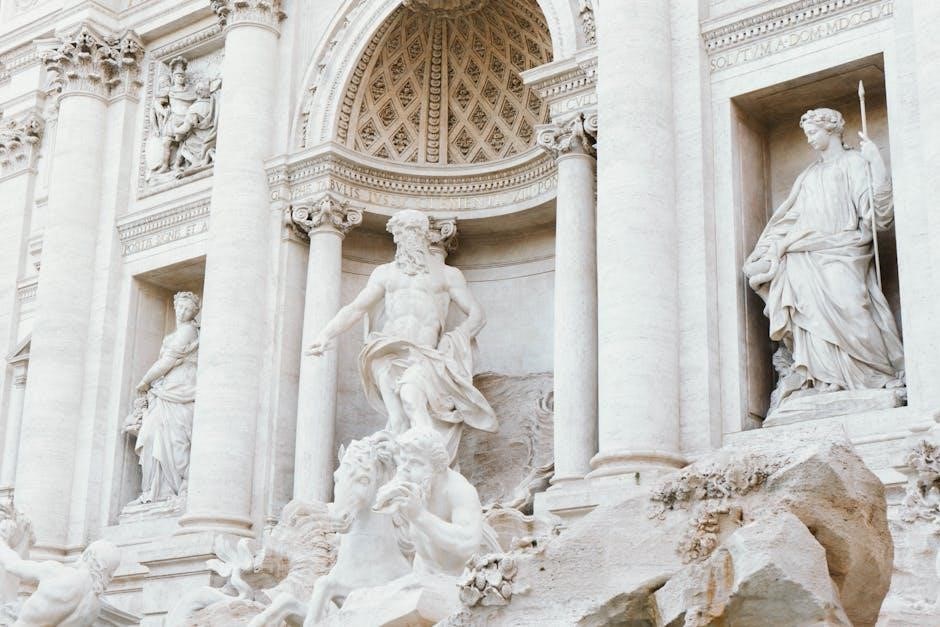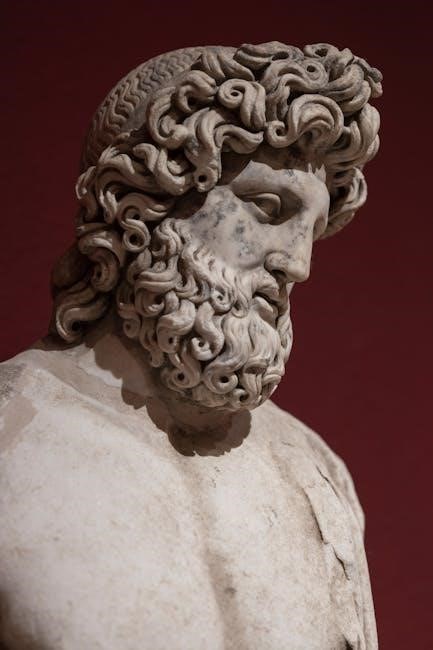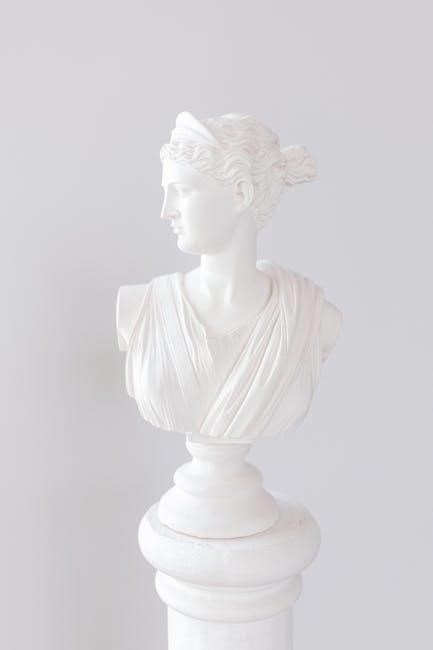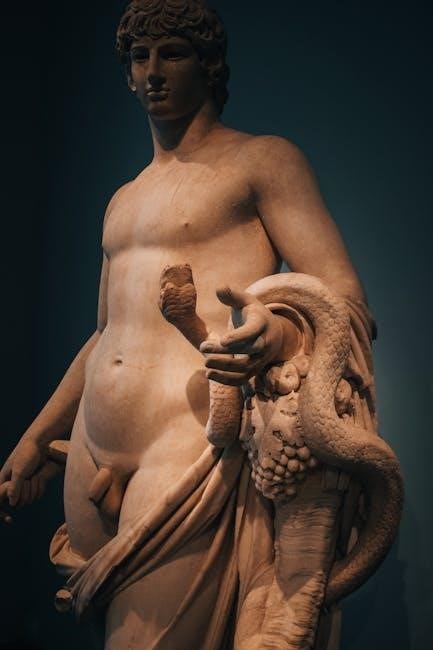greek gods percy jackson pdf
Percy Jackson’s Greek Gods: An Overview
Rick Riordan’s “Percy Jackson’s Greek Gods” presents Greek mythology through the eyes of Percy Jackson․ It offers a humorous and accessible introduction to the Olympian gods and other figures for young readers․
Embark on a thrilling journey into the world of Greek mythology with “Percy Jackson’s Greek Gods,” a captivating book penned by Rick Riordan and narrated by the witty demigod himself, Percy Jackson․ This action-packed tour serves up the gods like “flapjacks,” offering hilarious personal views on their feuds, fights, and love affairs․
Percy, with his unique perspective, delves into the origins of the Olympians, tracing their lineage back to the Titans and even further to the Protogenoi․ Discover how Zeus rose to become the top god and unravel the complex relationships within the pantheon․ Riordan masterfully retells ancient myths, making them accessible and engaging for modern readers, particularly young adults․
The book’s humor and relatable narration, coupled with its exploration of classic tales, make it an excellent introduction to Greek mythology․ It sparks interest in the subject while staying true to the essence of the original stories, albeit with a Percy Jackson twist․

The Olympian Gods in Percy Jackson
The “Percy Jackson” series brings the Olympian gods to life, portraying their powers, personalities, and roles within the context of the modern world and the demigod’s adventures․
Zeus: King of the Gods
In Rick Riordan’s “Percy Jackson” series, Zeus, the King of the Gods, is portrayed as a powerful and sometimes volatile figure․ He rules from Mount Olympus and commands the sky, wielding his iconic master bolt with formidable strength․ His presence is marked by thunder and lightning, symbolizing his authority over the cosmos․
Percy Jackson narrates Zeus’s stories with a blend of respect and humor, acknowledging his immense power while also highlighting his flaws, such as his tendency for dramatic pronouncements and occasional fits of rage․ The books delve into Zeus’s role in the Titan War and his complex relationships with other gods and demigods․
Zeus’s influence permeates the series, shaping events and influencing the lives of the characters․ His decisions, often driven by pride or fear, have far-reaching consequences for both gods and mortals․ Despite his flaws, Zeus remains a central figure, embodying the power and majesty of the Olympian pantheon․
Poseidon: God of the Sea and Percy’s Father
Poseidon, the God of the Sea, holds a significant role in the “Percy Jackson” series, most notably as Percy’s father․ He is depicted as a powerful and commanding figure, ruling over the oceans and wielding his trident with immense authority․ His connection to Percy is a central theme, shaping Percy’s identity and destiny․
Riordan portrays Poseidon with a mix of strength and compassion․ He is a formidable god, capable of unleashing devastating storms and controlling the tides․ Yet, he also displays a deep affection for his son, guiding and protecting him throughout his adventures․
Through Percy’s perspective, readers gain insight into Poseidon’s personality, his rivalry with Zeus, and his role in the events of the series․ Poseidon’s influence extends beyond the sea, impacting the world of demigods and gods alike․ His presence is a constant reminder of Percy’s heritage and the power he possesses as the son of the Sea God․
Athena: Goddess of Wisdom and Warfare
Athena, the Goddess of Wisdom and Warfare, is a prominent figure in the Percy Jackson series, embodying intellect, strategy, and courage․ She is portrayed as a powerful and respected Olympian, known for her tactical prowess and her patronage of heroes․
In Riordan’s depiction, Athena is not just a goddess of war, but also a symbol of knowledge and reason․ Her wisdom guides her decisions, and she values intelligence and strategic thinking above brute force․ Athena’s role extends beyond the battlefield, as she is also a patron of crafts and arts;
Through the character of Annabeth Chase, Athena’s daughter, readers witness the impact of Athena’s values․ Annabeth embodies her mother’s intelligence, resourcefulness, and strategic mind, making her an invaluable ally to Percy․ Athena’s presence in the series highlights the importance of wisdom and strategic thinking in overcoming challenges and achieving victory․ Her influence shapes the world of demigods and gods alike․

Other Important Gods and Goddesses
Beyond the Olympians, Percy Jackson’s world includes other significant deities․ These gods and goddesses, like Hades and Hestia, play crucial roles in shaping the narrative and mythology․
Hades: God of the Underworld
Hades, in the Percy Jackson series, is portrayed as a complex figure, far removed from the typical villainous depiction often associated with the God of the Underworld․ He’s one of the “Big Three,” alongside Zeus and Poseidon, bound by an oath not to have any more children, an oath he breaks with Percy’s mother․
Hades rules the Underworld, a vast and complex realm where the souls of the dead reside․ While he is stern and imposing, he is also depicted as a god who values justice and order․ His domain is not a place of eternal torment for most, but rather a final destination․
His relationship with his siblings is strained, particularly with Zeus․ Despite his isolation, Hades isn’t inherently evil․ The series explores his motivations and his sense of responsibility towards his realm․ He plays a pivotal role in the overarching plot․ His character is more nuanced, revealing a god burdened by his duties․
Hestia: Goddess of the Hearth
Hestia, though not one of the twelve Olympian council members in the traditional sense, holds a significant place in the Percy Jackson universe․ She is the gentle and kind goddess of the hearth, home, and family, embodying warmth, comfort, and domesticity․ In Riordan’s portrayal, Hestia chooses to step down from her Olympian seat to tend to the hearth, symbolizing her devotion to the heart of the home․
Hestia’s presence is a calming influence․ She represents the importance of family and unity․ She is often overlooked, her power lies not in grand displays, but in the quiet strength of the home․ She offers solace and guidance․
Unlike some of the more turbulent gods, Hestia is a beacon of peace and stability․ Her role emphasizes the significance of the simple things․ She reminds the characters of the importance of connection․ She represents the true meaning of home and belonging within the chaotic world of demigods․
Persephone: Queen of the Underworld
Persephone, the daughter of Demeter, is a complex and fascinating figure in the Percy Jackson series․ As the Queen of the Underworld, she rules alongside Hades, yet her story is deeply intertwined with the cycles of life, death, and rebirth․ Riordan portrays Persephone with a blend of vulnerability and strength․ She is bound to the Underworld for part of the year, causing winter when she is away from her mother․
Her relationship with Hades is not one of simple captivity, but a complicated bond․ There is an interesting mix of duty, affection, and perhaps even a hint of defiance․ Persephone embodies the duality of nature, representing both the beauty of spring and the darkness of the Underworld․
Her character highlights the themes of choice, compromise, and the acceptance of one’s own destiny․ She is a powerful queen who navigates the complexities of her role․ She also maintains a connection to the world above․

Mythological Accuracy and Percy Jackson’s Perspective
Riordan blends faithfulness to Greek myths with Percy’s narration․ It provides a unique lens․ While simplifying some aspects, the series retains core elements․ This introduces younger audiences to classical stories․
Riordan’s Interpretation of Greek Myths
Rick Riordan masterfully adapts Greek myths for a contemporary audience․ He presents these ancient tales through the relatable perspective of Percy Jackson․ This approach makes the myths engaging and accessible, particularly for younger readers․ Riordan doesn’t shy away from the darker aspects, but he often downplays or reimagines them to suit his target audience․ He understands that Greek myths have different versions, acknowledging the fluidity of oral tradition․
Riordan blends faithfulness with creative license, interpreting the gods’ personalities and actions through Percy’s humorous lens․ This interpretation offers a fresh take, highlighting the gods’ flaws and eccentricities while retaining their core identities․ The series also cleverly integrates lesser-known myths, enriching the narrative and exposing readers to a wider range of Greek lore․ Ultimately, Riordan’s interpretation strikes a balance between honoring the source material and crafting an entertaining story․

Influence and Reception
The “Percy Jackson” series has garnered immense popularity, especially among young readers․ Its engaging narrative and accessible approach to mythology have made it both entertaining and subtly educational․ It is widely celebrated․
Popularity Among Young Readers
The “Percy Jackson” series, including “Percy Jackson’s Greek Gods,” has captivated young readers with its modern take on Greek mythology․ Rick Riordan’s writing style, blending humor and adventure, makes ancient myths accessible and engaging for a younger audience․ Percy’s relatable voice and the fast-paced plots draw readers into a world where gods, monsters, and demigods coexist․
The books’ popularity stems from their ability to make learning about mythology fun․ Young readers are not only entertained but also introduced to classical literature and history in an approachable way․ The series sparks an interest in mythology that often leads to further exploration of Greek myths and legends․
Furthermore, the themes of friendship, courage, and self-discovery resonate with young readers, making the characters and their struggles relatable․ The blend of fantasy and reality creates a world that is both exciting and thought-provoking, contributing to the series’ enduring popularity․
Educational Value
Beyond its entertainment value, the “Percy Jackson” series, including “Percy Jackson’s Greek Gods,” offers significant educational benefits․ The books serve as an engaging introduction to Greek mythology, familiarizing young readers with the names, stories, and relationships of the Olympian gods, heroes, and monsters․ This exposure can spark an interest in classical literature, history, and ancient cultures․
Riordan’s writing skillfully weaves mythological elements into a contemporary setting, making them relevant and accessible to modern readers․ By presenting the myths through Percy’s perspective, the books encourage critical thinking and interpretation of ancient texts․ They also highlight the enduring themes and moral lessons found within Greek mythology, such as the importance of courage, loyalty, and perseverance․
Furthermore, the series can improve reading comprehension, vocabulary, and critical thinking skills․ The books’ popularity has led to their inclusion in school curricula, where they are used to supplement lessons on mythology and ancient history․ They provide a fun and engaging way for students to learn about and appreciate the rich cultural heritage of ancient Greece․
